The Best Hardware Store POS Software
We tested the most popular hardware store POS systems on the market and selected our favorites for stores of all sizes. See our results below.
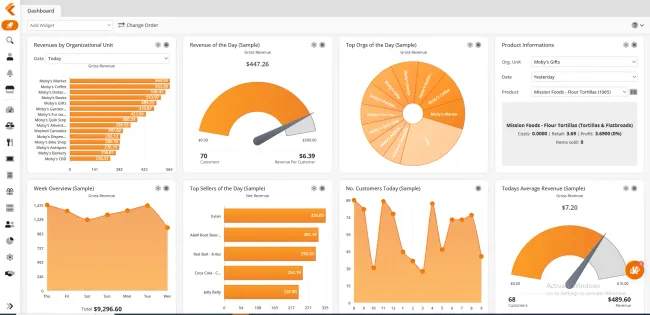
- Multiple users have praised customer support
- Supports multiple locations
- Credit card processing agnostic
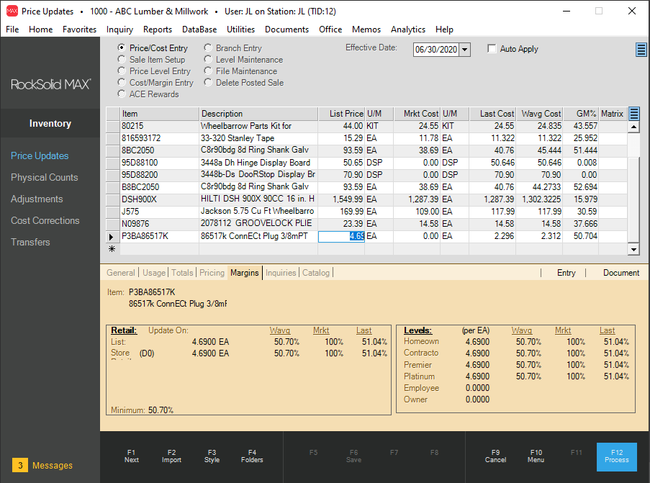
- Industry-specific POS software made for LBM business needs.
- Features mobile connectivity and special-order handling.
- Offers barcode support
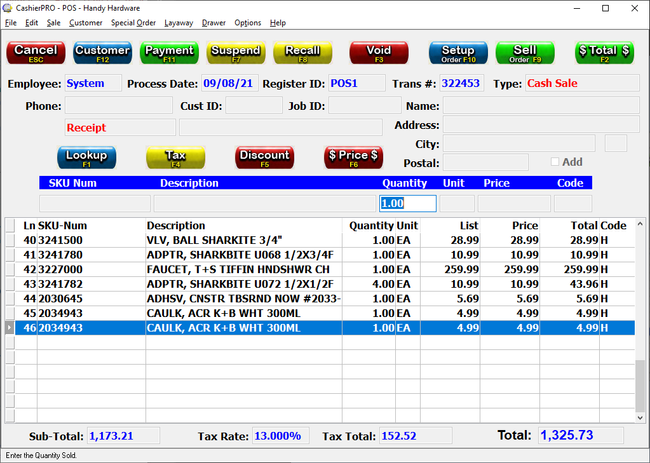
- Unlimited 24/7 support and free upgrades
- Good for small to mid-size retailers
- User-friendly and low learning curve
Hardware store POS (Point of Sale) software includes inventory management, sales tracking, CRM, and payment processing features. It’s designed to handle many products, including tools, building materials, and home improvement items. We used our advanced review methodology to select the top options for independent hardware stores to large chains
- KORONA POS: Best Overall
- Rocksolid MAX: Best for Independent LBM Suppliers
- CashierPRO: Best Purchase Ordering Functions
- J3 POS: Best for Bulk Hardware Products
- Lightspeed Retail: Best Multi-Location Support
- eHopper POS: Best Free Plan
- POS Nation: Best Reporting Options
- Epicor Eagle: Strong Inventory Management
- MicroBiz: Best for Special Orders
- Square: Transparent Pricing
KORONA POS - Best Overall
KORONA POS features an automatic retail price adjustment tool that helps ensure every product, from fasteners to plumbing supplies, stays profitable without constant manual updates. You can group items by category or brand and set minimum profit margins for each assortment. So when supplier costs change, your prices adjust automatically with no extra work needed.
Plus, this hardware store software supports customizable price patterns for more consistent customer-facing pricing. For example, KORONA POS can ensure all prices end in .99 or round them to the nearest dollar for a cleaner look. Overall, this helps you stay ahead of market fluctuations, stay competitive on everyday essentials, and protect profits on big-ticket items like power tools or lawn equipment.
KORONA has straightforward, transparent pricing. The Retail package starts at $69/month. You can opt for add-ons like invoicing as needed. KORONA POS sells hardware separately and also offers the option to lease.
Rocksolid MAX - Best for Independent LBM Suppliers
Rocksolid MAX is a solid choice for independent lumber and building materials (LBM) suppliers with its industry-specific features and cloud-based deployment. The system can handle a high volume of special orders, crucial for hardware stores selling custom supplies to businesses. Also, its POS system allows for fast checkout, returns processing, and data recording, which translates to accurate reports.
Plus, this hardware POS includes integrated inventory management, which syncs directly with vendors and syncs stock levels to meet changing customer demands. Furthermore, its document management functionality can help reduce physical paperwork. Rocksolid automatically uploads orders, transactions, and invoices to the filing system, saving independent stores time that would otherwise be spent on manual processes.
However, one downside is that businesses must upgrade to get delivery and dispatch modules.
CashierPRO - Best Purchase Ordering Functions
CashierPRO recommends restocking quantities based on actual sales data and predefined minimum/maximum inventory levels. This is vital for hardware stores to avoid overstocking on less popular items while ensuring high-demand products are always available.
Furthermore, CashierPRO’s intuitive interface simplifies operations for store staff. The added benefit of 24/7 customer support and complimentary upgrades helps resolve any technical issues swiftly, reducing downtime and maintaining efficient store operations. CashierPRO is an on-premise system that businesses purchase outright, which could be a deal breaker if you need a cloud-based solution.
J3 POS - Best for Bulk Hardware Products
J3 POS is another good option for small hardware stores. It features group pricing, strong inventory management, and pay-by-weight, which streamline operations for stores selling and buying lumber and bulk hardware products.
Its inventory management is also strong, with tools like lumber commodity pricing for large inventories with hundreds of different products. J3 POS also has 24-hour support, ideal for avoiding downtime during open hours. While it has effective features, its pricing is not public, so businesses must request a quote.
Lightspeed Retail - Best Multi-Location Support
Lightspeed Retail delivers advanced inventory management for established hardware stores. The system lets you track various hardware items across multiple locations efficiently. Lightspeed’s ability to easily add and manage product variations simplifies the intricacies of dealing with hardware inventory.
Moreover, Lightspeed Retail comes with a deep feature set, including detailed reporting and analytics, employee management, and customer tracking. These tools are invaluable for gaining insights into sales trends, managing staff efficiently, and understanding customer preferences. While some have noted the system’s complexity and the costs associated with hardware and software bundles, its strengths in inventory management make it a solid choice.
eHopper POS - Best Free Plan
eHopper provides flexibility to smaller hardware stores, functioning across platforms like iOS, Android, and Windows PC. Its free Essential Package, accommodating one POS system, is an excellent starting point for small hardware stores looking to manage sales and inventory without a large initial investment.
This package appeals to new or small-scale hardware businesses mindful of budget constraints. Features include customer management, employee tracking, and inventory control, enabling stores to efficiently manage a diverse range of hardware products, from tools to building materials. However, because it’s built for small businesses, eHopper does have limited reporting capabilities compared to a more advanced system.
POS Nation - Best Reporting Options
POS Nation includes advanced reporting functionalities with over 55 prebuilt templates. This makes it much easier to break down almost all financial data, like inventory, sales, and profit margins. Users can even export them to Excel if they prefer.
POS Nation offers unlimited inventory, allowing stores to carry as many products as they need at no additional cost. Plus, its customer account management tool lets you track B2B sales. This benefits stores that sell in bulk to businesses and need invoicing and account information.
Epicor Eagle - Strong Inventory Management
Epicor Eagle offers an integrated inventory management system with a POS system designed for high-SKU hardware stores. For inventory, you can track counts across multiple locations and automatically replenish items to prevent stockouts. Plus, it supports special order processing and barcode label printing to handle custom requests efficiently, which is crucial for hardware stores dealing with lumber or other materials.
Epicor Eagle takes your inventory and POS data to create predictive analytics and forecasts. So for seasonal items, like snow blowers or portable AC units, you can project sales and buy a more accurate amount of stock. For viewing everyday KPIs, the system has a custom dashboard to help you see trends and profitability at a glance. It’s an effective way to see overall performance and optimize stock for all seasons or demand shifts.
Beyond inventory, it combines customer loyalty programs, purchasing, and reporting into a single system, eliminating the need for multiple integrations. However, Epicor Eagle only offers on-premise deployment. The legacy architecture can lead to a higher initial price, and it’s generally more outdated compared to cloud offerings like LightSpeed.
MicroBiz - Best for Special Orders
MicroBiz is a solid pick if you’re constantly managing special orders. This system simplifies the process by allowing you to create purchase orders for special items right at the register. It then tracks these from order placement to supplier delivery, streamlining the entire process.
The MicroBiz alert system is a useful feature that notifies staff when a special order item arrives and identifies the relevant customer. This functionality enhances order accuracy and improves customer service, helping you track and process special orders precisely.
Square - Transparent Pricing
One of Square’s standout qualities is its transparent pricing structure. While the core POS software is free, Square maintains a clear and flat-rate pricing policy for transaction fees and optional services like payroll management. Its suite of integrated features and services makes it a cost-effective choice.
The free version of Square provides the core functionalities essential for hardware stores, such as efficient payment processing, inventory control, and customer data management, all without any setup fees.
What is Hardware Store POS Software?
A hardware store POS system is a digital point-of-sale solution software designed for managing sales transactions. This software typically includes features for inventory management, sales tracking, customer management, and processing various forms of payment. It caters to the specific needs of a hardware store, such as handling a wide range of products, including tools, building materials, and home improvement items.
How to Choose the Best Hardware Store POS System
-
Pricing Considerations: We prioritize POS systems that handle high volumes of low-cost items, such as nails and screws, without escalating per-transaction costs. Our review also examines hidden expenses, including fees for updates, support, or additional modules.
-
Inventory Management: We evaluate how effectively the POS software manages inventory, focusing on its ability to track items, automate reorder alerts, integrate with suppliers, and provide insightful reporting.
-
Customer Support: Next, we check the availability of comprehensive training materials and 24/7 customer support. This is crucial for stores that operate across varying hours or time zones.
-
Ease of Use: We assess POS systems for their intuitiveness and ease of operation, ensuring they can be customized to align with the unique workflows of different hardware stores.
-
Performance and Reliability: Finally, we gauge the software’s reliability through its uptime statistics and the frequency and quality of updates.
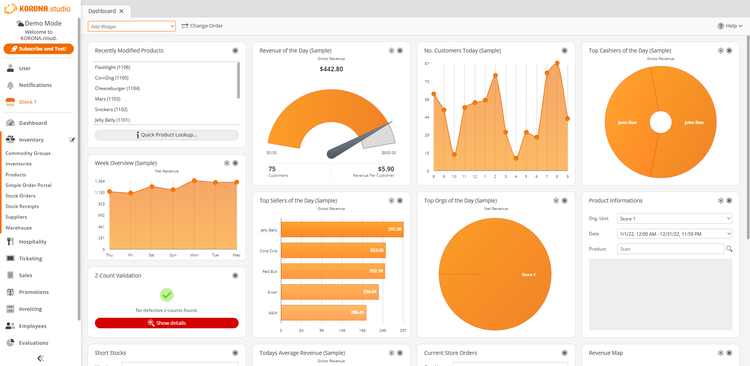
Key Features
-
Inventory Management: This is crucial for tracking a wide array of items, from small screws to large power tools. Features should include real-time inventory tracking, automatic reordering, barcode scanning, and managing items sold in various units (individual, weight, or volume).
-
UPC Catalog: An integrated parts database and Universal Product Code (UPC) catalog help employees identify and track inventory items in hardware stores. This feature often includes items with descriptions, prices, and stock levels.
-
Customer Relationship Management (CRM): Features such as managing customer information, tracking purchase history, offering loyalty programs, and creating targeted marketing campaigns can help personalize the customer experience and increase loyalty.
-
Seasonal Order Support: These features help hardware stores manage inventory according to seasonal demand fluctuations. This involves automated ordering systems that adjust order quantities based on the time of year.
-
Sales Reporting and Analytics: Detailed reports on sales, customer preferences, inventory levels, and other analytics are vital for informed decision-making and understanding market trends.
-
Hardware Compatibility: The POS software should be compatible with various hardware devices such as barcode scanners, receipt printers, cash drawers, and possibly touch-screen displays.
-
Kit Sales Support: Kit sales features allow hardware stores to bundle products together and sell them as a single package or kit. These can be used for promotional bundles or for items commonly purchased together.
-
Supplier Management: Integration with supplier systems for easier ordering and stock management, especially for stores with numerous vendors.
-
Payment Processing: The system should handle multiple forms of payment, including cash, credit/debit cards, mobile payments, and possibly financing options for larger purchases.
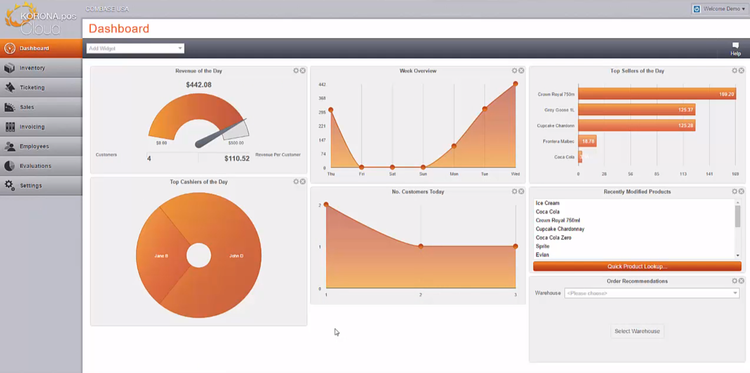
Pricing Guide
Starter Tier ($49-$150/terminal/month):
- Targeted Users: Ideal for small, independent hardware stores or start-ups.
- Features: Basic POS functionalities tailored for hardware retail, like simple inventory tracking for common items, sales and payment processing, and basic reporting features.
- Benefits: Provides an affordable entry point for small stores to automate sales and inventory management, with enough capabilities to handle day-to-day operations efficiently.
Mid-Tier ($130-$450/terminal/month):
- Targeted Users: Suited for growing hardware stores with expanding inventory and customer base.
- Features: Enhanced capabilities, including advanced inventory management for numerous hardware items, improved CRM tools, detailed sales reporting, and support for promotional activities and seasonal adjustments.
- Benefits: Balances cost with a broader range of functionalities, aiding in managing more complex inventory and providing better customer service.
Enterprise Tier ($400-$999/terminal/month):
- Targeted Users: Designed for large hardware store chains or franchises.
- Features: Comprehensive suite including high-end analytics, multi-location management, integrated parts database and UPC catalog, kit sales features, and extensive supply chain and business management software integrations.
- Benefits: Supports high-volume transactions, complex inventory, and customer management needs of large enterprises. Offers scalability and advanced tools necessary for extensive operational demands.
Custom Pricing Packages Availability: Some POS providers may offer customized pricing options to cater to the unique requirements of hardware stores, like special integrations, specialized hardware support, or specific scalability needs.
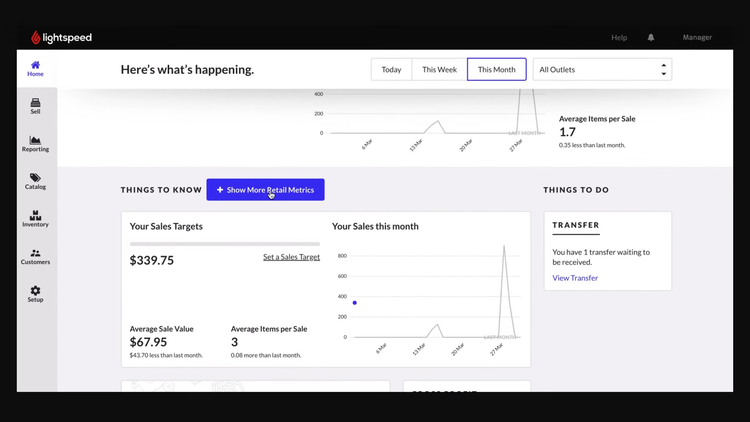
Primary Benefits
-
Minimizing Inventory Shrinkage: A POS system can help identify and reduce losses due to theft, damage, or administrative errors by closely monitoring inventory.
-
Effective Promotions and Pricing Strategy: Hardware stores can more effectively implement dynamic pricing strategies, seasonal discounts, and promotions.
-
Enhanced Customer Experience: POS systems can offer quicker service, accurate billing, easy returns and exchanges, and personalized promotions, all of which contribute to a better customer experience.
-
Data-Driven Decision Making: Advanced reporting and analytics provided by POS systems give insights into sales trends, inventory turnover, and customer preferences, aiding in more informed business decisions.
-
Multi-Store Management: A POS system can integrate sales, inventory, and customer data across all store locations, providing a consolidated business view.



















































